- Trending:
- Forgiveness
- |
- Resurrection
- |
- Joy
- |
- Afterlife
- |
- Trump
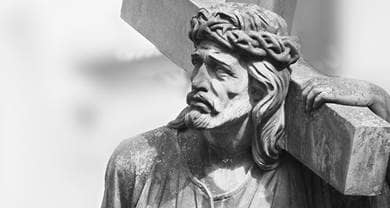
RELIGION LIBRARY
Christianity
Beginnings
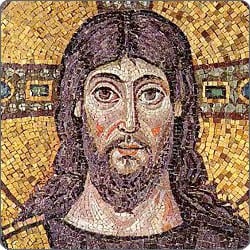 Christianity originated in the life and teachings of Jesus of Nazareth, who was born circa 4 B.C.E. in Roman-occupied Palestine, a Jewish province of the Roman Empire.
Christianity originated in the life and teachings of Jesus of Nazareth, who was born circa 4 B.C.E. in Roman-occupied Palestine, a Jewish province of the Roman Empire.
The first century of the Common Era was a time of political instability, insurgency, and suffering. Poverty, taxation, famine, and epidemics of disease had made life intolerable for many. In the year of Jesus' birth, the Roman authorities had punished an armed uprising by crucifying approximately 2,000 people.
 Many Jews of the time thought they were living in the "end times," a time of trial and tribulation that would end with God's intervention. They looked for God to destroy the enemies of the Jews and institute a kingdom of justice and righteousness, which would be the Kingdom of God. Most Jews hoped that God would expel the Romans, and that his envoy, the Messiah, would appear to rule the new world. They believed the Messiah would be a king or a military leader from the line of King David, and that his coming was foretold in scripture, e.g., Isaiah 9:1-7.
Many Jews of the time thought they were living in the "end times," a time of trial and tribulation that would end with God's intervention. They looked for God to destroy the enemies of the Jews and institute a kingdom of justice and righteousness, which would be the Kingdom of God. Most Jews hoped that God would expel the Romans, and that his envoy, the Messiah, would appear to rule the new world. They believed the Messiah would be a king or a military leader from the line of King David, and that his coming was foretold in scripture, e.g., Isaiah 9:1-7.
| Isaiah 9:5 |
| For a child is born to us, A son is given to us; Dominion will rest on his shoulders, And he will be given the name Wonderful Counselor, Mighty God, Father of Eternity, Prince of Peace. |
Most of what we know about Jesus' life and teaching comes from the four Gospels of the New Testament. The New Testament's Book of Acts gives an account of the founding of a new community by Jesus' disciples, along with a new convert named Paul.
| Four New Testament Gospels |
| Matthew Mark Luke John |
According to the Gospels, Jesus launched a public ministry sometime in his late twenties. He was one of many Jewish preachers of the time who viewed themselves as reformers and prophets. John the Baptist, another preacher, baptized him. 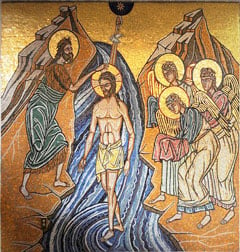 He called twelve men to be his disciples, and together they traveled around Palestine, preaching and teaching about the coming Kingdom of God. The Gospels report that after about three years Jesus was arrested while in Jerusalem at Passover. Convicted as a threat to public and religious order, Jesus was whipped and nailed to a cross. This form of execution, called crucifixion, was a common practice of the Roman authorities.
He called twelve men to be his disciples, and together they traveled around Palestine, preaching and teaching about the coming Kingdom of God. The Gospels report that after about three years Jesus was arrested while in Jerusalem at Passover. Convicted as a threat to public and religious order, Jesus was whipped and nailed to a cross. This form of execution, called crucifixion, was a common practice of the Roman authorities.
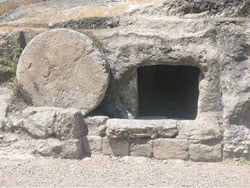 The Gospels place Jesus' death on a Friday, so he was buried before the start of the Sabbath at sundown. On the following Sunday, several women who were followers of Jesus returned to anoint his body with oil, and found the tomb empty. Other followers described encounters with Jesus, and his disciples became convinced that Jesus had been raised from the dead.
The Gospels place Jesus' death on a Friday, so he was buried before the start of the Sabbath at sundown. On the following Sunday, several women who were followers of Jesus returned to anoint his body with oil, and found the tomb empty. Other followers described encounters with Jesus, and his disciples became convinced that Jesus had been raised from the dead.
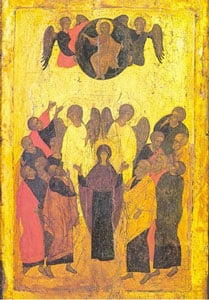 The account of Jesus' life and ministry concludes in the Book of Acts with his ascension. Acts 1:9 says that "he was taken up before their very eyes, and a cloud hid him from their sight." As the disciples stood gazing up into the sky, two men in white robes appeared beside them and said, "Men of Galilee, why do you stand here looking into the sky? This same Jesus, who has been taken from you into heaven, will come back in the same way you have seen him go into heaven" (Acts 1:11). The disciples took this as a promise of Jesus' return.
The account of Jesus' life and ministry concludes in the Book of Acts with his ascension. Acts 1:9 says that "he was taken up before their very eyes, and a cloud hid him from their sight." As the disciples stood gazing up into the sky, two men in white robes appeared beside them and said, "Men of Galilee, why do you stand here looking into the sky? This same Jesus, who has been taken from you into heaven, will come back in the same way you have seen him go into heaven" (Acts 1:11). The disciples took this as a promise of Jesus' return.
 They then gathered in Jerusalem on the festival of Shavuot (also called Pentecost), where a dramatic event took place. "Suddenly a sound like the blowing of a violent wind came from heaven and filled the whole house where they were sitting. They saw what seemed to be tongues of fire that separated and came to rest on each of them" (Acts 2:2-3). The disciples began to speak in multiple languages, and Jewish pilgrims from distant locations could understand them, each in their own language. One of Jesus' disciples, Peter, stood up and preached the first Christian sermon. This day is commemorated by many Christians as the Birthday of the Church.
They then gathered in Jerusalem on the festival of Shavuot (also called Pentecost), where a dramatic event took place. "Suddenly a sound like the blowing of a violent wind came from heaven and filled the whole house where they were sitting. They saw what seemed to be tongues of fire that separated and came to rest on each of them" (Acts 2:2-3). The disciples began to speak in multiple languages, and Jewish pilgrims from distant locations could understand them, each in their own language. One of Jesus' disciples, Peter, stood up and preached the first Christian sermon. This day is commemorated by many Christians as the Birthday of the Church.
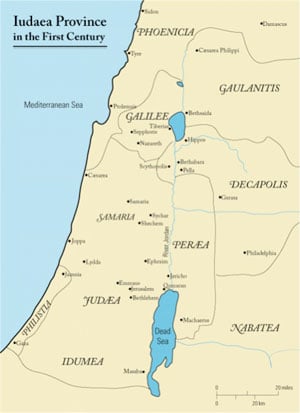 The disciples began baptizing people, and their community of baptized Jews grew quickly. They continued to think of themselves as Jews and continued attending the temple, reading the Jewish scriptures, keeping the Sabbath, and adhering to Jewish dietary and religious practices. But other Jews, viewing them as a sect that worshipped a false messiah, persecuted them. Persecution forced the spread of Jewish Christians from Jerusalem to the country districts of Judea and Samaria.
The disciples began baptizing people, and their community of baptized Jews grew quickly. They continued to think of themselves as Jews and continued attending the temple, reading the Jewish scriptures, keeping the Sabbath, and adhering to Jewish dietary and religious practices. But other Jews, viewing them as a sect that worshipped a false messiah, persecuted them. Persecution forced the spread of Jewish Christians from Jerusalem to the country districts of Judea and Samaria.
The Book of Acts reports that the first Christian martyr was a deacon named Stephen, who was stoned to death for witnessing to Jesus as the Messiah.  A Jew named Saul, a Roman citizen from Tarsus in Asia Minor, joined in the persecution of the Jewish Christians. However, Acts 9 reports that Saul had a vision of Jesus on the road to Damascus.
A Jew named Saul, a Roman citizen from Tarsus in Asia Minor, joined in the persecution of the Jewish Christians. However, Acts 9 reports that Saul had a vision of Jesus on the road to Damascus.
As he neared Damascus on his journey, suddenly a light from heaven flashed around him. He fell to the ground and heard a voice say to him, "Saul, Saul, why do you persecute me?" "Who are you, Lord?" Saul asked. "I am Jesus, whom you are persecuting," he replied. "Now get up and go into the city, and you will be told what you must do" (Acts 9:3-6).
Thereafter Saul, later known as Paul, became the great Christian missionary, energetically evangelizing around the Mediterranean, particularly among non-Jews. Paul is credited with extending the reach of the Christian message beyond the Jewish communities of Palestine, founding non-Jewish Christian communities in several important cities of the Roman Empire.

Study Questions:
1. Describe the political instability at the time of Christianity's origin. Why was Jesus' identity as a Jew important?
2. Where does Christianity's account of Jesus' life originate? What key points within his life are stressed?
3. What was Pentecost? How did it mark the birth of the Christian Church?
4. Why did Jews persecute early Christians? Provide a famous example.










